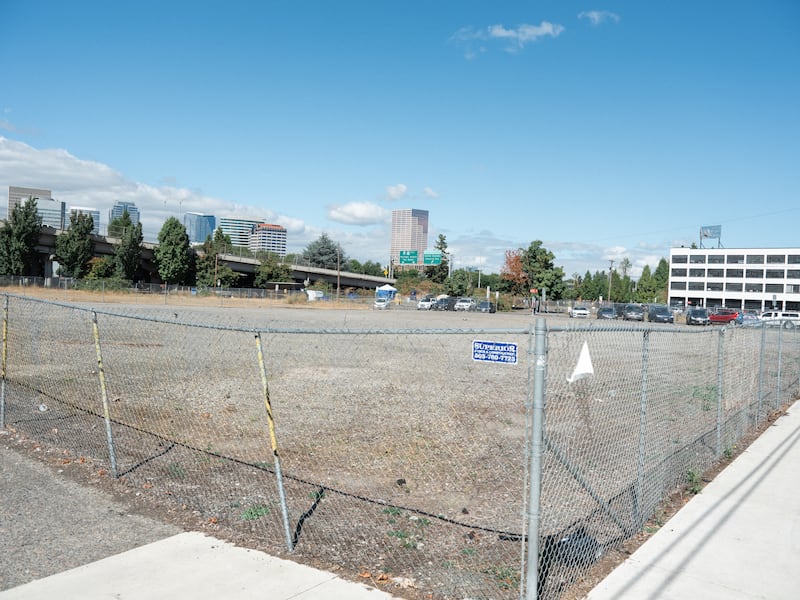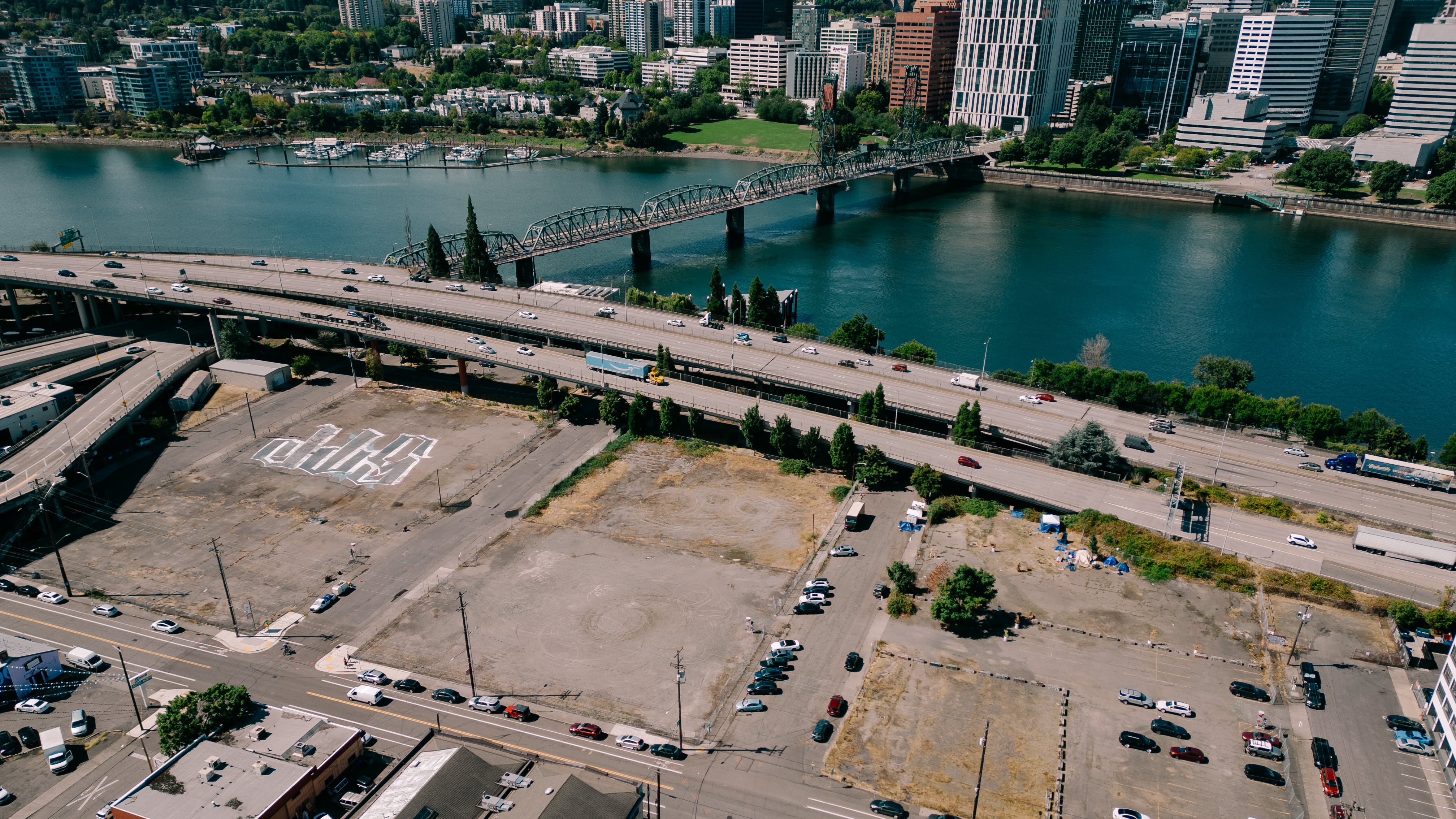At first glance, it looks like a great deal for a town that needs a jump-start.
A developer would build a new music venue seating almost 4,000. Building the ballroom would create 411 jobs paying out $35 million in wages. Once it’s complete, the owners would pay almost $600,000 in property taxes each year. Hotels, still hurting from the pandemic, would fill 5,000 rooms a year with those about to rock.
All of this would happen on a piece of vacant land on Southeast Water Avenue, just north of the Hawthorne Bridge, bringing more life to a neighborhood beset by blight. Best of all, maybe, when Wilco plays Bend, they might not skip Portland.
All of this is described in a draft study commissioned by Prosper Portland, the city’s economic development agency, which owns the land and is pushing the project. The developers are Beam Development and Colas Development Group. The builder is Colas Construction. Both are local, and Colas is Black-owned.
“As outlined in this report, the proposed development is projected to have a range of economic and fiscal impacts in the city of Portland and Multnomah County,” says the study, newly obtained by WW. “The impacts include new employment, payroll, spending with vendors on construction and operations, new tax revenue, and indirect and induced economic activity.”
So what’s the problem? Two words: Live Nation.
The proposed venue would be run by Live Nation Entertainment, the largest live entertainment company in the world. Live Nation, based in Beverly Hills, Calif., owns or controls 338 music venues worldwide, including the Hayden Homes Amphitheater in Bend, the Gorge Amphitheatre in George, Wash., and Lumen Field in Seattle. It manages 410 bands, from U2 to Pitbull. It promotes concerts and, in 2010, bought Ticketmaster, giving it end-to-end control of the live music business.
Luring Live Nation to Portland, the only large American city without a Live Nation venue, is like baiting a bear into your camp on Mount Hood, according to local venue owners. It might be entertaining for a while, but what happens when the beast won’t leave?
As it happens, Portland is home to one of Live Nation’s fiercest critics: David Leiken, owner of the Roseland Theater. Until recently, Leiken owned Double Tee Concerts, founded in 1972, which promoted hundreds of bands from Foreigner and Styx to Bonnie Raitt and Whitney Houston. He had his own concert-ticketing operation until 1999, when he sold it to TicketsWest, so, like Live Nation, he knows the business from end to end.
Portland’s leaders, Leiken says, are making a grave mistake.
“I’m deeply disturbed that the city of Portland would choose to ally itself with a company intertwined with Ticketmaster, which has led to major Justice Department concerns, and has been propped up by massive infusions of capital from the Saudi Arabian government,” Leiken says in an email. “It makes LIV Golf look like child’s play.”

Many of Leiken’s assertions are easily confirmed by reporting from cities across the country where Live Nation operates.
In order to complete the Ticketmaster purchase, Live Nation had to guarantee the U.S. Department of Justice that the company wouldn’t withhold Live Nation tours from independent venues that didn’t care to sell tickets through Ticketmaster. But three years later, Live Nation moved a Matchbox Twenty show from the popular Gwinnett Center in Atlanta because it had stopped using Ticketmaster, according to The New York Times.
Live Nation appears to push ticketing for a reason. The company generates most of its revenue from promoting shows: $13.5 billion in 2022. But that business lost $158 million from operations last year. It had operating losses from 2017 through 2021, too. Ticketing, meantime, had revenue of just $2.2 billion in 2022 but made $623 million. In that sense, its shows are something of a loss leader, like milk in a (really big) grocery store (that sold mostly milk).
And it’s true that one of Live Nation’s biggest investors is Saudi Arabia’s Public Investment Fund. The autocratic oil kingdom disclosed a $500 million stake in Live Nation in April 2020, just as COVID was raging and less than two years after Saudi journalist Jamal Khashoggi was murdered and cut to pieces in the Saudi embassy in Turkey in a plot the CIA says was directed by Saudi leader Mohammed bin Salman.
All of which makes Leiken wonder why the city would get into bed with the Saudis—rather than him.
In an interview, Leiken described how he went to Prosper Portland with a proposal for a similar venue in Old Town, using buildings that are becoming empty as the University of Oregon moves its Portland programs to the Concordia University campus, which it bought last year.
“It was a superior opportunity,” Leiken says, “and I got the runaround.”
Spokesman Shawn Uhlman says Prosper staff met with Leiken a year or so ago, but he asked for too much money. Nor was a venue a priority under the 2014 Old Town/Chinatown Action Plan. “His requested amount would have required almost all remaining resources Prosper Portland has available” for the neighborhood, Uhlman says in an email. “Staff explained to him that a venue conversion was not a priority identified in the Old Town Action Plan and that district funds were already committed for other projects.”
Mayor Ted Wheeler supports the Live Nation project, says spokesman Cody Bowman.
“This investment in our community will positively impact workers, small businesses, and the Central Eastside neighborhood while requiring no public subsidy,” Bowman says in an email. “There’s a clear gap in the market for a venue of this size.”
Jonathan Malsin, co-founder of Beam Development, defended his decision to partner with Live Nation. “A ground-up concert venue at this site is a viable project that will generate economic impact for the community,” Malsin says in an email. “Live Nation is a strong financial partner and is also investing in the design and construction. As a community asset, the venue will host a variety of events and will also be available to all local promoters to book.”
The Live Nation project got started in 2015, when the Portland City Council adopted the Southeast Quadrant Plan. The area along Water Avenue was bustling, and the city wanted to keep the good times rolling.
As part of a 20-year plan, Prosper bought three square blocks in the area from the Oregon Department of Transportation, which had declared it “surplus.” Prosper asked for proposals for what to do with the land in late 2017. Beam Development pitched a series of office buildings with industrial space that would bring more jobs to the area. In May 2018, Prosper picked Beam to lead the project, working with Colas.
Two years later, the pandemic hit, and everyone who could work from home left the office. Building more office space would have been insane. Beam pivoted and last year said it would partner with Live Nation on a music venue instead.
Prosper’s draft report, prepared by local firm Johnson Economics, dismisses most of Leiken’s concerns about Live Nation. It would increase competition with local venues, especially the Arlene Schnitzer Concert Hall and Keller Auditorium, both of which hold about 3,000, but they don’t have the standing room that the new facility would, so there is a gap for it to fill, the report says.
“National booking data indicates that roughly 43% of shows have between 1,000 and 4,000 attendees,” the report says. “This show size accounts for an estimated 32% of tickets sold and 22% of revenues nationwide. The proposed facility addresses a critical gap in the City’s overall portfolio of venues, with limited overlap with existing facilities.”
As for anti-competitive behavior that would favor Ticketmaster, the report says that “all venue operators and promoters of scale have ticket sales operations (including locals).” And Live Nation would be an “open venue,” letting other promoters book acts there.
Jamie Dunphy knows the Live Nation project well. He worked for City Commissioner Nick Fish, who died in 2020, and in that capacity sat on the committee that selected Beam Development for the project. These days, Dunphy works in government relations for the American Cancer Society Cancer Action Network, but he volunteers with MusicPortland, a group that advocates for musicians and independent venues because he wants to keep Live Nation out of Portland.
Like others at MusicPortland, Dunphy fears that one Live Nation venue will lead to more, putting pressure on independent venues that don’t charge as much for tickets. And he hates the idea of subsidizing the construction of a venue for a corporate behemoth.
Mayor Wheeler says there are no subsidies, but Dunphy begs to differ. When Beam planned to build office space on an adjacent block, Prosper offered to charge Beam rent of $132,991 a year, or $11,083 a month, based on a land value of $3.3 million. Both figures were a bargain, Dunphy says. Prosper says it will use a similar methodology for rent on the Live Nation block and that the yearly rate conforms to the market and in no way constitutes a subsidy.
“Live Nation can afford to build their own venue,” Dunphy says. “If they come into Portland unchecked, subsidized by a public entity, that’s the end of the Portland music scene.”
